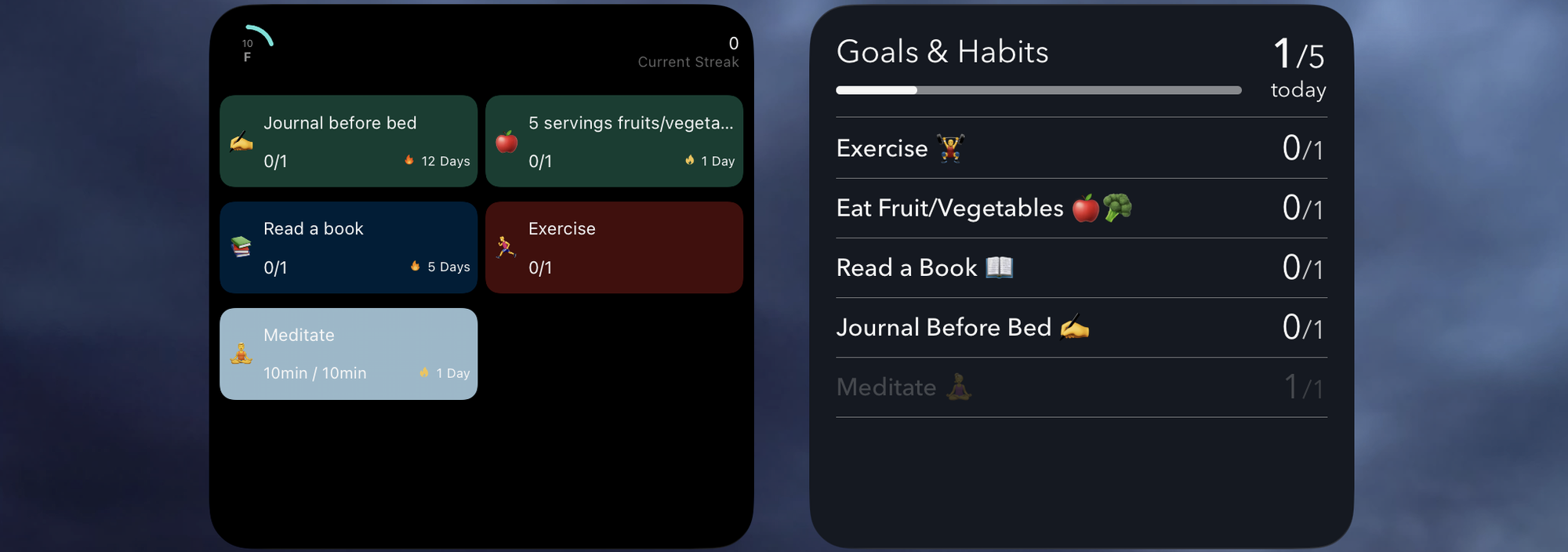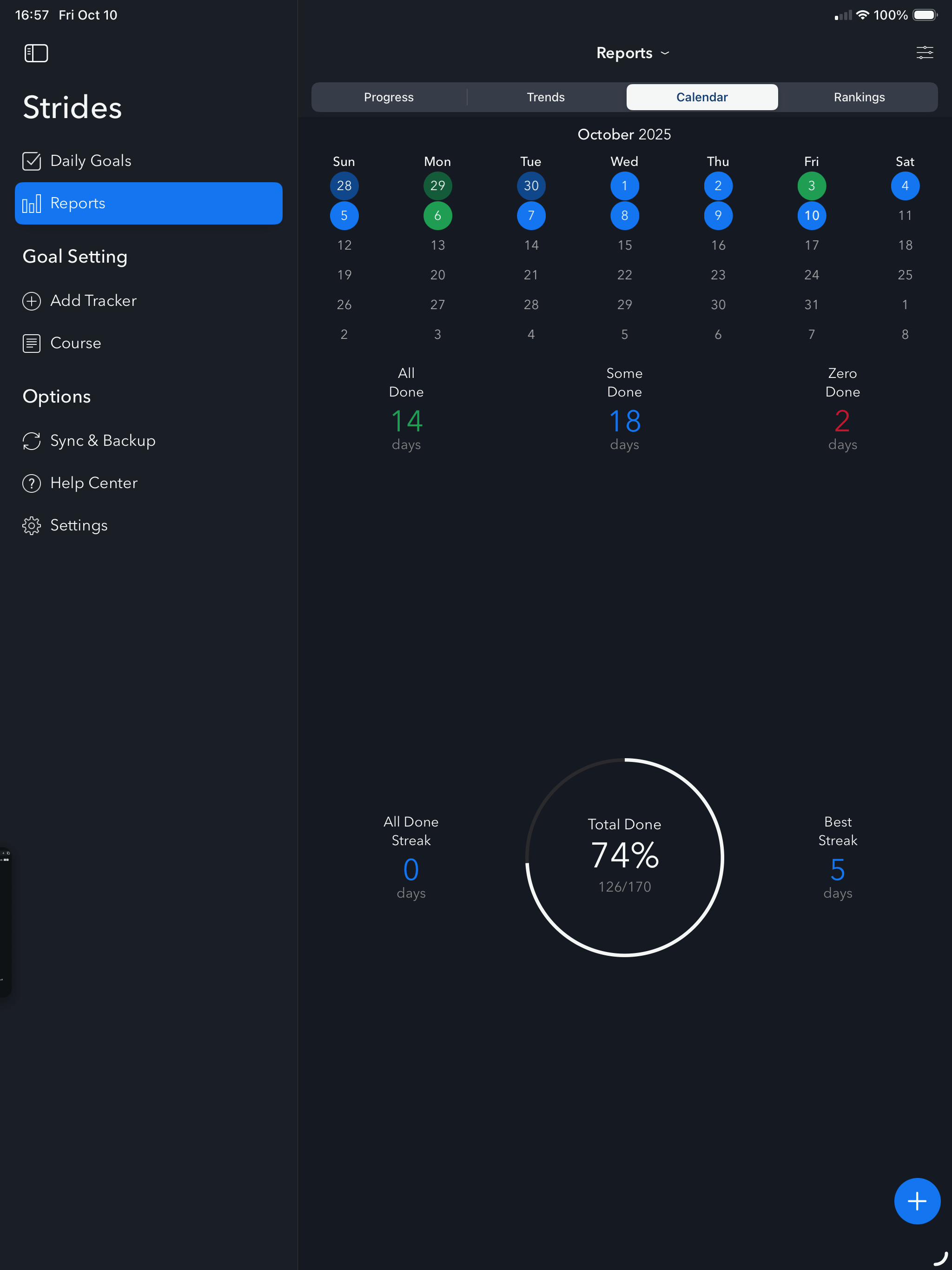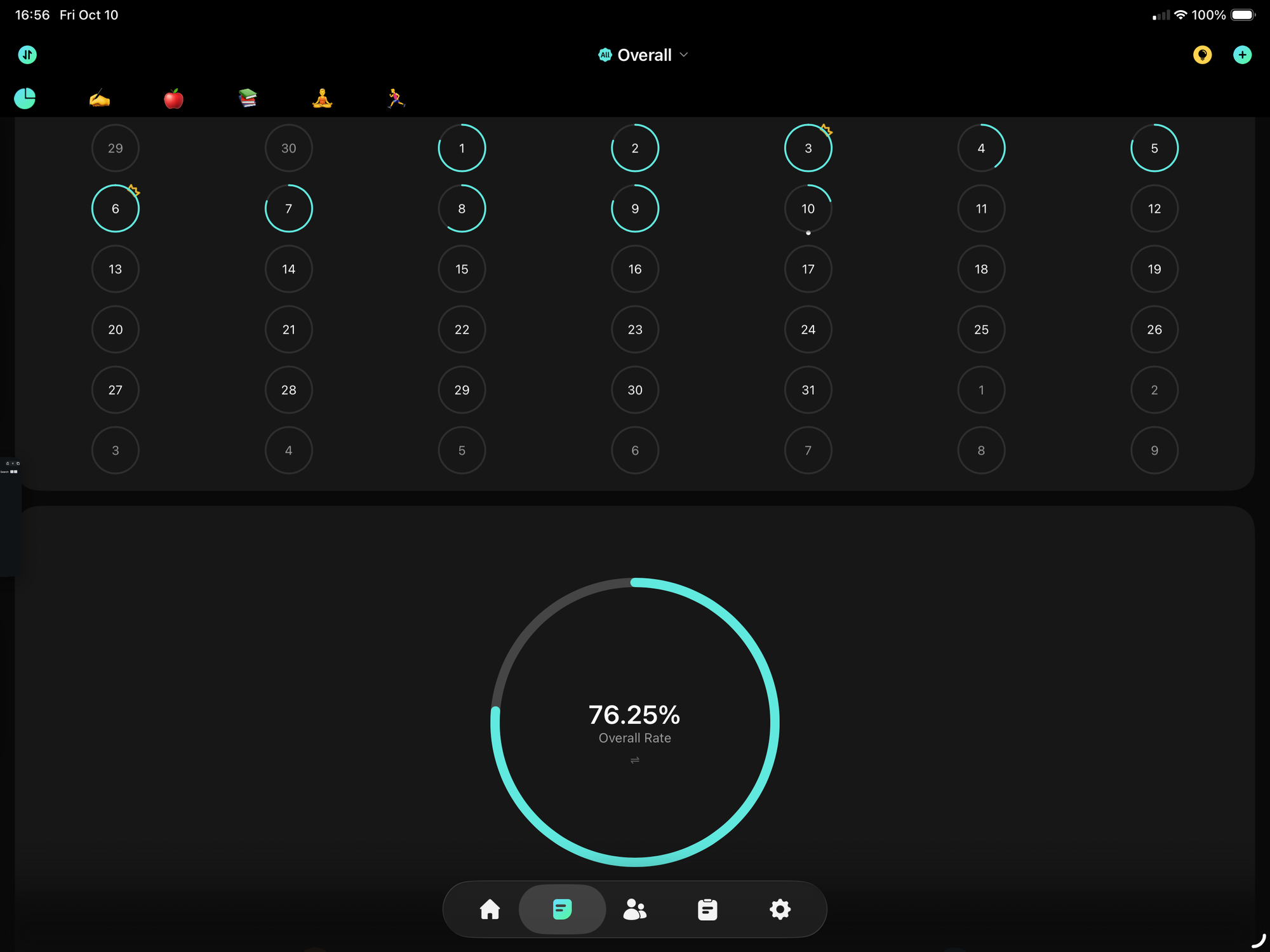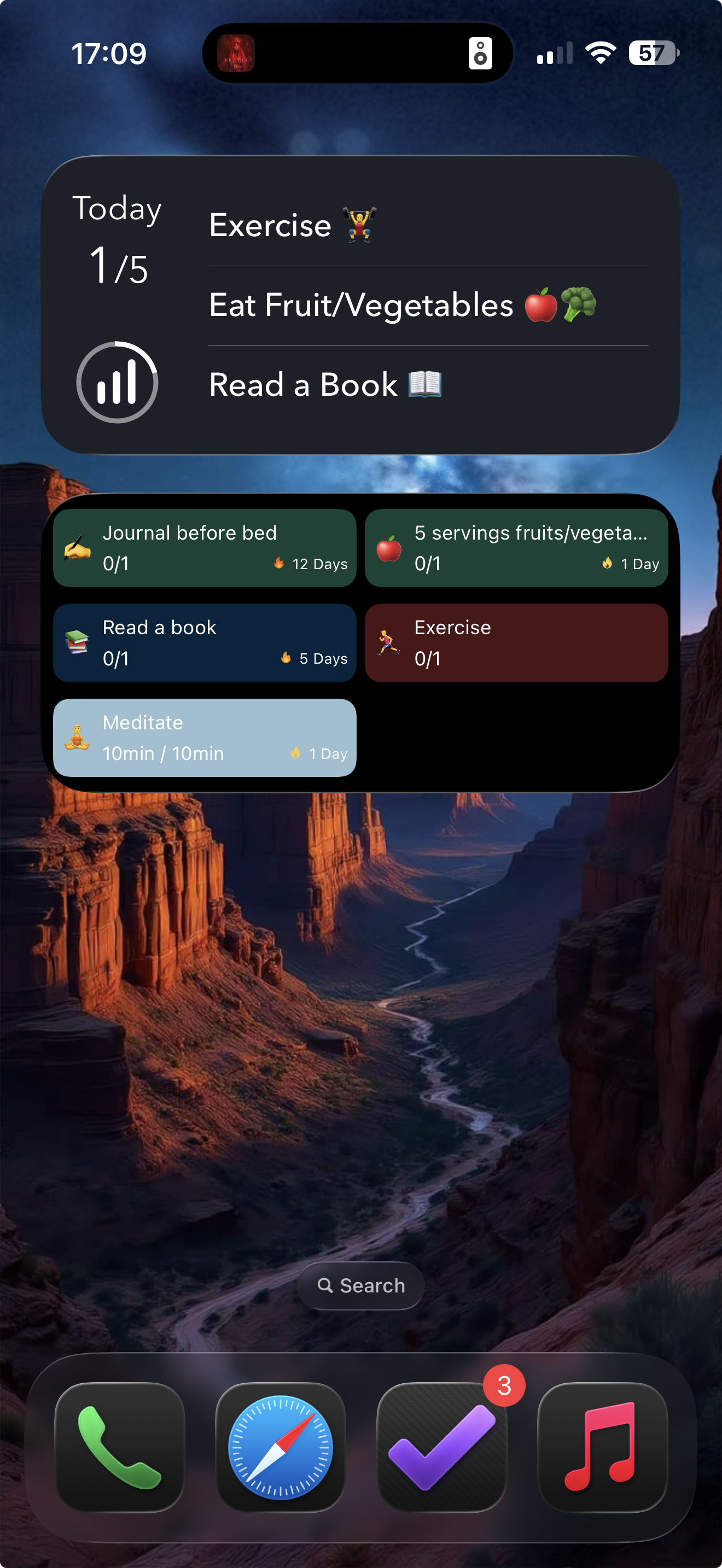Imperfect Progress: Finishing the 30-Day Habit Challenge

Habits are the entry point, not the end point. They are the cab, not the gym.
—James Clear, in Atomic Habits
Thirty days can pass in an instant. Before it begins, it seems like a reasonably long amount of time. Once done, it barely seems like anything at all.
When I decided to do a 30-day habit tracking challenge, I was convinced that this was enough time to really make a difference. Now that I've reached the end, I realize it is just a beginning, an on-ramp, an entry.
Not a destination.
Now that I'm on the path, I need to keep moving forward.
Let's cut to the chase: Building new habits is difficult.
More difficult than I thought.
Generally, our habits form without us realizing it. We don't appreciate how many times we did something before it became automatic. To us, it is just something we do.
Intentionally trying to form new habits shines a bright light on just how much time and effort it takes for them to become ingrained.
That is a long way to say that none of these habits feel automatic yet.
As I noted at the mid-point check-in, it feels like work. Every day I am reminding myself: meditate, eat the fruits and veggies, read, etc. Some have become easier to do, that much I have noticed. Not automatic, but they require less energy to make happen.
It absolutely still requires effort and conscious thought, though.
Let's take a look at some of the data.
I had zero regrets in moving on from Habitify. While there were aspects of the app I really liked, there were too many drawbacks. It was the most cumbersome to log each habit. The data presentation just wasn't effective.
Strides and Habit Tracker continue to both impress and be well-matched.


Truth be told, I didn't find myself going into the data all that often. So is it that useful? I still think it will require more time and use to be helpful. However, both apps present statistics clearly.
The most useful aspect of both apps remains the widgets.

The ability to both be reminded of and quickly log my habits was the most powerful aspect of both apps. This will be something I continue to take advantage of.
What about the habits? Did they make any difference?
Yes, they did. And some more than others. Let's break down each habit.
5 servings of fruits/vegetables
Increasing my fruits and vegetables is something I know I should be doing. But after only thirty days, there weren't any effects that I could see. This habit needs to be a longer-term one if I want there to be positive effects. I recognize this. At the same time, knowing there are benefits, the sooner I work it into my daily routine, the better off I will be.
Others, though, had more obvious benefits.
Meditation
Meditation was the habit with the most obvious benefits. Studies clearly show that it helps with stress management, lowers cortisol levels, and has de-aging effects on the brain, amongst others.
What surprised me was how quickly I felt that I could manage my stress better. It wasn't a day-to-day change, but it only took a few days for me to feel like I had more control over myself in any situation I was in. There were plenty of times I wasn't in as much control as I wanted, but those moments became less common over the course of the month.
I am committing to continuing a practice of meditation. There is no doubt that it has both short and long-term benefits.
Exercise
Exercise is another we all know is good for us. And while I made sure that I was moving more, I was still far from where I wanted to be. I need to be really ensuring that I am lifting weights, in addition to just moving throughout the day. There is no question that the benefits are there. On the days I was more active, I felt it. I have a long way to go with this one. It was a start.
Reading
I greatly enjoyed reading regularly. Setting this as one of my habits helped it become a part of my day, and something I looked forward to. Like many of the other habits, this wasn't something where I wondered if it would be good for me. I know reading is important, just something I had fallen out of the habit of doing regularly.
Evening Journaling
My final habit was journaling before bed. This one was a bit more complicated.
I've been journaling daily since the start of the year. I've found great value in the practice. My most consistent journaling has been in the morning, in a handwritten journal. When I began journaling in the evening, I had a series of prompts that I answered each night.
Over time, this felt restrictive; my motivation to continue to answer those prompts waned, and the practice stopped.
I hoped that this would help reignite that practice, but in a less restrictive manner.
It didn't really work.
This is the habit that I have had the most completions over the last thirty days, yet has felt the least meaningful. Many nights, I wrote a few sentences and then called that good.
I find great value in journaling, but my evening practice needs some work, and this challenge didn't inspire me to make that more impactful. I did write more, though. I hope that getting back into that habit, regardless of how short some entries were, will help it become more sticky, which will lead to more mindful entries.
What about the act of logging the habits? Was it rewarding?
No, it wasn't.
But it was motivating, at least to some degree. I would have loved it to have been more so. My desire to complete the challenge was the real motivation, and the apps acted as a reminder to do so.
It didn't have the impact I hoped that it would, but it made enough of a difference that I plan to continue.
So that leads to one final question: Which app wins?
It was very close. My preference often changed daily. Over the last week, though, I have been gravitating back to Strides. It is the one that I started tracking with, and I can see why. The interface is clean. The data is useful (at least as far as it was in any of them), and logging was quick and easy.
I preferred seeing all five habits on the widget for Habit Tracker, but it was occasionally finicky in a way that Strides wasn't. Its interface was a bit too cute for me as well. I prefer the more utilitarian appearance of Strides.
Both are very good apps, and I wouldn't hesitate to recommend either to anyone. Habit Tracker is a bit less expensive, and that puts it ahead in some ways.
But if you ask me which I want to keep using, I've landed on Strides. Habit Tracker will be coming off my devices, and Strides' widget will grow a bit on the phone so that I can see all five habits at once.
Wrap-up
We use the word "habit" regularly. As a concept, we all understand what they are. But there is a power in making new habits, habits we have chosen intentionally. It's easy to forget that, and just keep doing the same old actions.
At the same time, there is no question that people want to change. Were that not the case, the self-help section of every bookstore wouldn't be nearly as large as it is. Too often, we fall into the trap that we need to make huge, sweeping changes for them to matter.
The truth is much more subtle and simple. Small, consistent changes are what will really alter our course. I've seen it in my own life. But it is easy to forget. The big, flashy stuff draws our attention. It's far more exciting to embark on a dramatic challenge. There is a reason that, despite the absolute lack of evidence, things like the "75 Hard" challenge are so popular.
Those make for great online content as well. They trigger our lizard brain with the promise of massive dopamine hits. We gear up, sign up, and jump in.
And we burn out.
Even if we finish all 75 days, rigidly sticking to the plan, when it's over, where are we? We end up right back where we started for one fundamental reason:
It isn't sustainable.
That's the power of habits. Effective ones aren't flashy. They aren't massive changes. They are small adjustments that, eventually, fade into the background. If they are effective, they are sustainable. They have lasting power.
And they compound. Small change, over time, has a multiplicative, or even logarithmic, power for change in our lives.
I've seen the glimmers of some change via this challenge. That's the most I expected to see in only 30 days. But it's enough.
Enough to motivate me to stick with them. Enough to keep doing them until they truly are habits.
It isn't perfection. It's consistency, even when imperfect.
